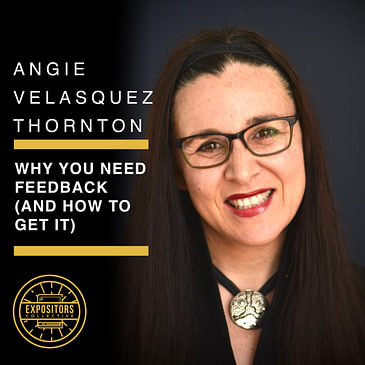Angie Thornton (Women's Ministry Director for TGC Quebec) speaks with Mike about the importance of seeking feedback and input from others as well as the irreplaceable value of solitude when it comes to preparing to teach the Bible. They speak about the significance of seeking input on your teachings, both before and after the message has been delivered. Learn how constructive feedback can enhance your impact and deepen your understanding of God's Word.
Thinking of Bible teaching as a "Community Project" will challenge conventional notions as we discuss the communal aspect of Bible teaching. Angie believes that teaching is not just a solo venture but a collaborative effort within the community of faith.
There are some tips about how to navigate feedback: How to give it and how to receive it!
The longest section of the conversation focuses specifically on why men who teach the Bible should specifically seek out the input and the unique perspectives of women, and in so doing, are actually putting in to practice the complementarian convictions that we both hold dearly.
Whether you're a seasoned teacher or just starting, Angie Valasquez Thornton's insights will inspire you to embrace the collective wisdom of the community for a richer, more impactful teaching ministry.
Together with her husband Dan, Angie served the Lord in Senegal for 10 years in leadership development. Settled in Montreal with their 2 daughters since August 2017, they continue to train leaders among French Canadians, the least evangelized people group in the North America. Angie is the Women's Ministry Director for The Gospel Coalition Quebec (SOLA) and a columnist at The Gospel Coalition Canada. She blogs in French at TPSG, where she also co-hosts a weekly podcast. You can access her YouTube channel here. Angie holds an MDiv from Moody Theological Seminary.
Resources Mentioned:
Preachers Talk: Giving and Recieving Feedback - https://simeontrust.org/preachers-talk-episode-9-on-giving-and-receiving-feedback-on-preaching/
Preaching that Speaks to Women - Alice Matthews : http://bakerpublishinggroup.com/books/preaching-that-speaks-to-women/227040
Transforming your Preaching through Careful Self-Evaluation https://expositorscollective.org/expositors-collective-podcast/transforming-your-preaching-through-careful-self-evaluation-with-joe-terreri/
Connect with Expositors Collective:
For information about our upcoming training events visit ExpositorsCollective.com
The Expositors Collective podcast is part of the CGNMedia, Working together to proclaim the Gospel, make disciples, and plant churches. For more content like this, visit https://cgnmedia.org/
Join our private Facebook group to continue the conversation: https://www.facebook.com/groups/ExpositorsCollective
Click here to support Expositors Collective





